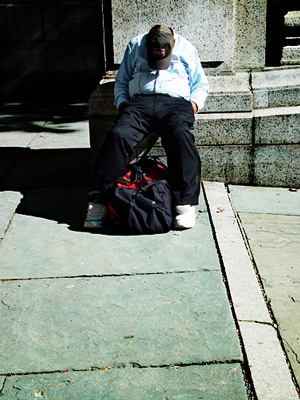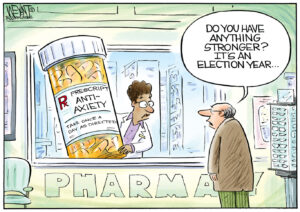Nearly 9 of 10 Low-Wage Workers Fear They Can’t Make Ends Meet
A new poll finds that workers on the bottom rungs of the economic ladder face job-loss anxiety levels not seen since the 1970s. The vast majority also say they fear their family incomes can't keep them afloat financially. This is the American economic reality for those not riding the Dow Jones average.
Judging by the records being set on Wall Street and steady reports by corporations of high profits and hoarded cash, you’d think the economy was doing well. Yet a new poll reports that six of every 10 American workers fear getting fired or laid off, the highest measured level of job anxiety since the 1970s.
Welcome to the new America.
The poll, by The Washington Post and the University of Virginia’s Miller Center, casts into sharp relief the everyday anxieties of the working poor, and argues that the sense of unease has become something of a permanent condition among people struggling to make ends meet. From the Post:
Job insecurities have always been higher among low-income Americans, but they typically rose and fell across all levels of the income ladder. Today, workers at the bottom have drifted away, occupying their own island of insecurity.
Fifty-four percent of workers making $35,000 or less now worry “a lot” about losing their jobs, compared with 37 percent of lower-income workers in 1992 and an identical number in 1975, according to surveys by Time magazine, CNN and Yankelovich, a market research firm. Intense worry is far lower, 29 percent, among workers with incomes between $35,000 and $75,000, and it drops to 17 percent among those with incomes above that level.
Lower-paid workers also worry far more about making ends meet. Fully 85 percent of them fear that their families’ income will not be enough to meet expenses, up 25 points from a 1971 survey asking an identical question. Thirty-two percent say they worry all the time about meeting expenses, a number that has almost tripled since the 1970s.
The mood even transcends our fractious politics. The Post reports that “once you control for economic and demographic factors, there is no partisan divide. There’s no racial divide, either, and no gender gap. It also doesn’t matter where you live.”
The Post framed the poll story around the daily life of John Stewart, 55, who makes $5.25 an hour plus occasional tips wheeling elderly passengers through a Philadelphia-area airport. Stewart has worked low-wage jobs since the 1970s, when the economy was strong and diverse enough to offer a place for a worker with a high school education and few skills. “In the years back then,’’ Stewart told the Post, “if you left a job, you were able to find another job, within the next day or the same week.”
Not any more. In 2010 Stewart lost a job at a New Jersey Wal-Mart — tardiness was the issue, he told the Post, due to relying on public transportation — and moved to Philadelphia to start over. It took him five months to find the airport job, and that was through a friend from church.
Ironically, although the poll found those at the bottom of the wage ladder have the highest levels of uncertainty, they also have the highest levels of belief that they will some day find better-paying jobs — even as they acknowledge they lack the means to obtain the kinds of skills that would help them do that.
Several economists say there’s a simple explanation for that gap: Poorer people can’t spare the time or money to go to school. Stewart, for example, would love to ditch his airport job to work as a hospital aide, hopefully for higher pay and at least some health benefits. (His job now offers none.) He’d need to take classes to earn a certification to qualify for that work. He has no idea how he’d swing that, financially. But he has hope that he will — and that, too, is typical of low-earning, anxious workers today.
Nearly six in 10 of those workers think it’s likely they’ll find a new job that pays better in the next five years, compared with fewer than four in 10 middle- and upper-income workers. Almost half expect a significant raise at their current job in the next half-decade, again outpacing the optimism of those who currently take home more.
That seems, though, to just reflect the relative space down the economic ladder, and above, as well as the gap between hope and reality. It also brings to mind that old Doors song, “Well, I’ve been down so Goddamn long/That it looks like up to me.”
—Posted by Scott Martelle.
Your support is crucial...As we navigate an uncertain 2025, with a new administration questioning press freedoms, the risks are clear: our ability to report freely is under threat.
Your tax-deductible donation enables us to dig deeper, delivering fearless investigative reporting and analysis that exposes the reality beneath the headlines — without compromise.
Now is the time to take action. Stand with our courageous journalists. Donate today to protect a free press, uphold democracy and uncover the stories that need to be told.






You need to be a supporter to comment.
There are currently no responses to this article.
Be the first to respond.